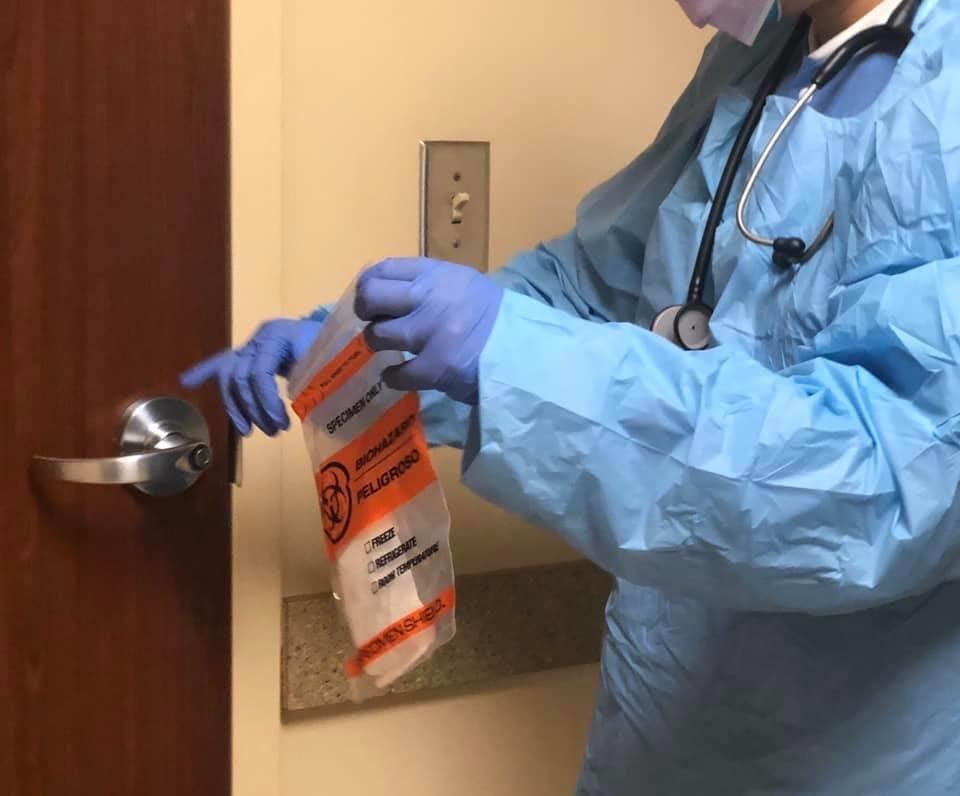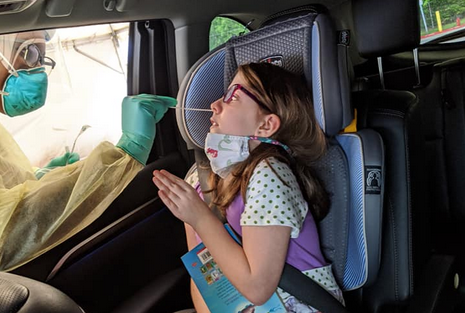
Section Branding
Header Content
COVID-19 'Long-Haulers' Face Heart, Lung, Fatigue Issues Linked To Inflammation
Primary Content

Shortness of breath. Chronic fatigue. Muscle tremors. Brain fog.
Many people who clear the novel coronavirus say they continue to suffer effects from COVID-19 infection. These “long haulers” include patients who were hospitalized as well as folks who never received a positive test for the disease.
One thing they all seem to have in common is inflammation or a high inflammatory state where the body continues to be under a lot of stress, said Dr. Heval Kelli, a cardiologist with Georgia’s Northside Hospital Cardiovascular Institute.
Inflammation is common after a severe infection of any kind, he said.
“(Inflammation) tends to cause damage to various parts of your body, and one of the areas that we see a lot of damage in addition to the lung is the heart,” Kelli said.
While people infected with COVID-19 may have related heart and lung damage, others are at risk due to underlying conditions such as obesity and high blood pressure that may not get treated because people are afraid to get regular checkups due to the pandemic.
“COVID-19 for many people unmasks an unhealthy lifestyle, too,” Kelli said.
Dr. Allison Dupont, another cardiologist with Northside, said her colleagues are seeing fewer heart attacks and strokes. Part of the reasoning might be people staying home and avoiding doctors’ offices.
“Given the degree of stress that many people are under due to the pandemic, we know that it is highly unlikely that there has been an actual decrease in these events in the recent months,” she said. “Rather, patients are staying at home longer and presenting to the hospital later in the course of their illness, when there is already irreversible damage done to the heart or brain.”
But women are also affected by socioeconomic circumstances such as single mothers who must help children with remote school, Dupont said.
Inflammation in the body
Laura Castiglione of Forsyth County tested positive for the virus in early April. The then 38-year-old spent weeks in isolation in her bedroom, separated from her husband and three children.
Even after testing negative for the virus, months later Castiglione still felt exhausted and ill.
“I was having a ton of shortness of breath, and my chest just hurt,” she said. “It ached all the time and it seemed like the more that I was doing, the more it hurt.”
She said she could push on parts of her chest and feel the underlying inflammation in her lungs.
“It felt like they were just on fire,” she said.
Castiglione’s doctor ruled out a blood clot and said the likely cause of the pain was pleurisy, which is common inflammation in the lungs after a viral infection.
The long-term impact is still unknown
Dr. Jonathan Kim, the chief of sports cardiology at Emory University, agrees with the idea that COVID-19 is a multi-system disease that presents initially as a respiratory infection.
In roughly 20% of cases where patients were hospitalized, doctors find evidence of cardiac injury such as myocarditis, Kim said.
High-profile cases of athletes diagnosed with myocarditis made news in August, including a 14-year-old freshman at Statesboro High School whose mother, Ashley White, said had no pre-existing conditions.
“He has been extremely sick,” White said. “The doctors have diagnosed him now with COVID-19 induced myocarditis. They are telling me that he will not be able to go back to school or play sports for some time. He will have to continue to be treated by respiratory therapists and cardiologists for the next several months.”
At its core, myocarditis is defined as inflammation of the heart muscle, and it's typically brought on by viral infections, Kim said.
Northside’s Kelli cited one study that showed 46% of patients with no history of cardiac problems presented with abnormal ultrasound after having COVID-19.
"Please keep in mind that COVID-19 is a new disease for the medical community and we still do not understand or know the long-term impact," Kelli said on Facebook.

Effects on children
The Centers for Disease Control and Prevention recently reported that as many as 20% of those aged 18 to 34 who have COVID-19 experience lasting symptoms. But less is known about the effects on younger children.
Kira Johnson, who has an underlying mitochondrial disorder, tested positive for COVID-19 back in April, when she was 9.
“She struggled with inflammation and her eyes kept getting bloodshot,” Jeannie Johnson said. “She had headaches and stomachaches and was super fatigued and she had a fever every day for over 80 days.”
Johnson worried her daughter might have pediatric inflammatory syndrome or what is now known as multisystem inflammatory syndrome in children or MIS-C.
MORE: CDC Confirms Link Between Pediatric Inflammatory Syndrome And COVID-19
Children with MIS-C can have problems with their heart and other organs and need to receive medical care in a hospital.
But Johnson said they recently saw a specialized cardiologist who reviewed Kira's previous echocardiograms and determined her heart was structurally OK but not functioning properly.
The cardiologist diagnosed Kira with dysautonomia, Johnson said.
Dysautonomia is an umbrella term used to describe several different medical conditions that cause a malfunction of the Autonomic Nervous System, which controls functions of the body such as heart rate, blood pressure, digestion, dilation and constriction of the pupils of the eye, kidney function and temperature control.
People living with various forms of dysautonomia have trouble regulating these systems, which can result in light-headedness, fainting, unstable blood pressure, abnormal heart rates, malnutrition, and in severe cases, death.
“The way she explained it to me, blood is not making its way back up to Kira's heart and brain properly,” Johnson said. “That's why she has struggled with low blood pressure. The brain triggers adrenaline to get the blood to go where it's supposed to, so essentially she's in fight or flight mode perpetually.”
Dysautonomia can cause excessive fatigue and has been known to develop in people with mitochondrial disorders.
Kira Johnson’s cardiologist said there's no way to know if all her post-viral symptoms are due to coronavirus, but that if she were going to develop it anyway, COVID-19 definitely kicked it into high gear.
Thousands of people who have cleared coronavirus but remain ill have connected in support groups.
Castiglione, the mother of three who lives in Cumming, remains active in an online support group she joined during her battle with COVID-19 and its side effects.
“It's now September, and I have standing four-week appointments with a pulmonologist," she said. "I've had two CT scans, lots of chest X-rays, an echocardiogram and have been checked for blood clots."
In addition to everything else going on, she feels like the virus has taken a toll on her mental health.
“I have anxiety I've never had before, including panic attacks, which is apparently a common side effect for women,” Castiglione said.
If she and the other long haulers can move from clearing the virus to living symptom free, then they will feel they have truly recovered from COVID-19.

